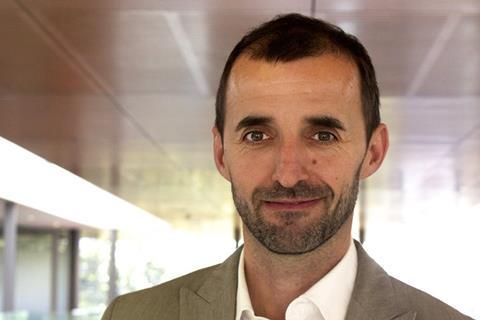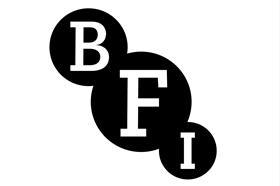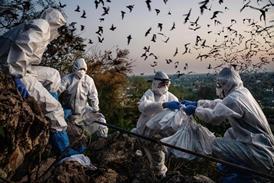
The dual challenges of the pandemic and Brexit have been tumultuous to navigate for the UK’s film and high-end TV (HETV) production sector. And yet the industry has adapted not only to survive, but to flourish.
With recently-published British Film Institute (BFI) statistics revealing a $1.7bn (£1.2bn) spend for film and high-end TV in the final quarter of 2020 — the second highest three-month spend on record and a return to pre-Covid growth levels of 2019 and early 2020 — recovery is clearly underway.
“We’ve engineered our own survival and recovery, and we did that by coming together as an industry,” says Adrian Wootton, chief executive of Film London and the British Film Commission (BFC).
The BFC was fast off the mark with the creation of its detailed Covid Production Guidance for film and HETV. These are practical recommendations on methods to adopt across all departments to ensure a production is Covid-secure (including mandatory testing and social distancing measures), giving productions the confidence to continue to film safely.

“When we were able to turn the lights back on in the film studios in July, we kept on updating our guidance,” notes Wootton.
This has made the UK one of the safest countries in which to shoot, and in 2020 film and high-end production spend in the UK was over $3.9bn (£2.84bn), with inward investment representing $3.3bn (£2.36bn) of that total.
The varied productions contributing to the spend include Warner Bros’ The Batman, Universal’s Jurassic World: Dominion and Sony’s Cinderella, UK-European co-productions Christian Carion’s English remake of his 2017 film My Son, Ruben Ostlund’s Triangle Of Sadness and Pablo Larrain’s Spencer, and homegrown projects such as Kenneth Branagh’s Belfast and Eva Husson’s Mothering Sunday.
“We’ve probably got more shooting going on in the winter than we’ve ever had before,” said Wootten. “This increasing demand is now being met by an investment in expanded studio space in places like Liverpool, Belfast and Barking and Dagenham. The government’s enhanced funding for the BFC included in the March 2020 budget also recognises the continuing importance of the sector to UK economic growth.”
With industry investment in additional space and also skills training for new entrants and those from other industries, confidence is high that growth will continue.
Wootton also underlines the importance of the Screen Sector Task Force. Headed by the BFI, this is a group of over 100 senior representatives from the film, TV, animation, VFX and videogame industries which was brought together in response to the Brexit referendum and has subsequently developed policy recommendations in response to the Covid-19 crisis.
“The BFI’s role has been working as a key channel for informing the sector of the latest developments and what needs to be planned for,” says Neil Peplow, the BFI’s director of international affairs, “and informing government of the priority needs in order to continue to collaborate with European partners, facilitate co-production and exports and import activity.”
The BFI has also set up an emergency Covid-19 fund, which has helped over 3,000 people in the sector since March 2020, and worked with producers’ organisation Pact to secure the government-backed $697m (£500m) Production Restart Indemnity Scheme for UK film and TV productions struggling to get insurance for Covid-related costs.
A new era
Just as UK production has risen to the challenges of the pandemic, the industry is equally as confident that it will successfully manage the UK’s exit from the EU. With the UK government having established a Global Screen Fund of $9.8m (£7m), the BFI is now in talks with industry stakeholders about how to best structure the fund in its pilot year ready for an April launch.

“Working with the Department of Digital, Culture, Media and Sport, we have consulted across every part of the UK industry in setting out the key areas that the Global Screen Fund will cover, to ensure it is relevant to the sector’s international ambitions for collaboration and whilst aligning with government expectations,” says Peplow.
UK umbrella stands at festivals and markets such as the EFM, where Wootton is chairing a panel about UK production benefits and opportunities (March 3, 18:00 CET), are vital for the development of the UK industry’s international relationship development.
“I remain more than glass-half-full about the post-EU exit landscape,” says Wootton. “I’m convinced we will find a new roadmap for creative collaboration with Europe. Working through challenges like visas, permits and the movement of equipment is not only in our interest, but that of our European partners who wish to share the economic benefits of filming coming from the UK into different European territories.
“We have great European partnerships, relationships with the funding bodies, state agencies and film commissions and we are all now looking to the future.”
Sponsored by

British Film Commission
The UK. First for world-class film and television production. The British Film Commission provides free, tailored support, from development through to delivery.

British Film Institute
The British Film Institute (BFI) is the UK’s lead organisation for film, television and the moving image.

























No comments yet